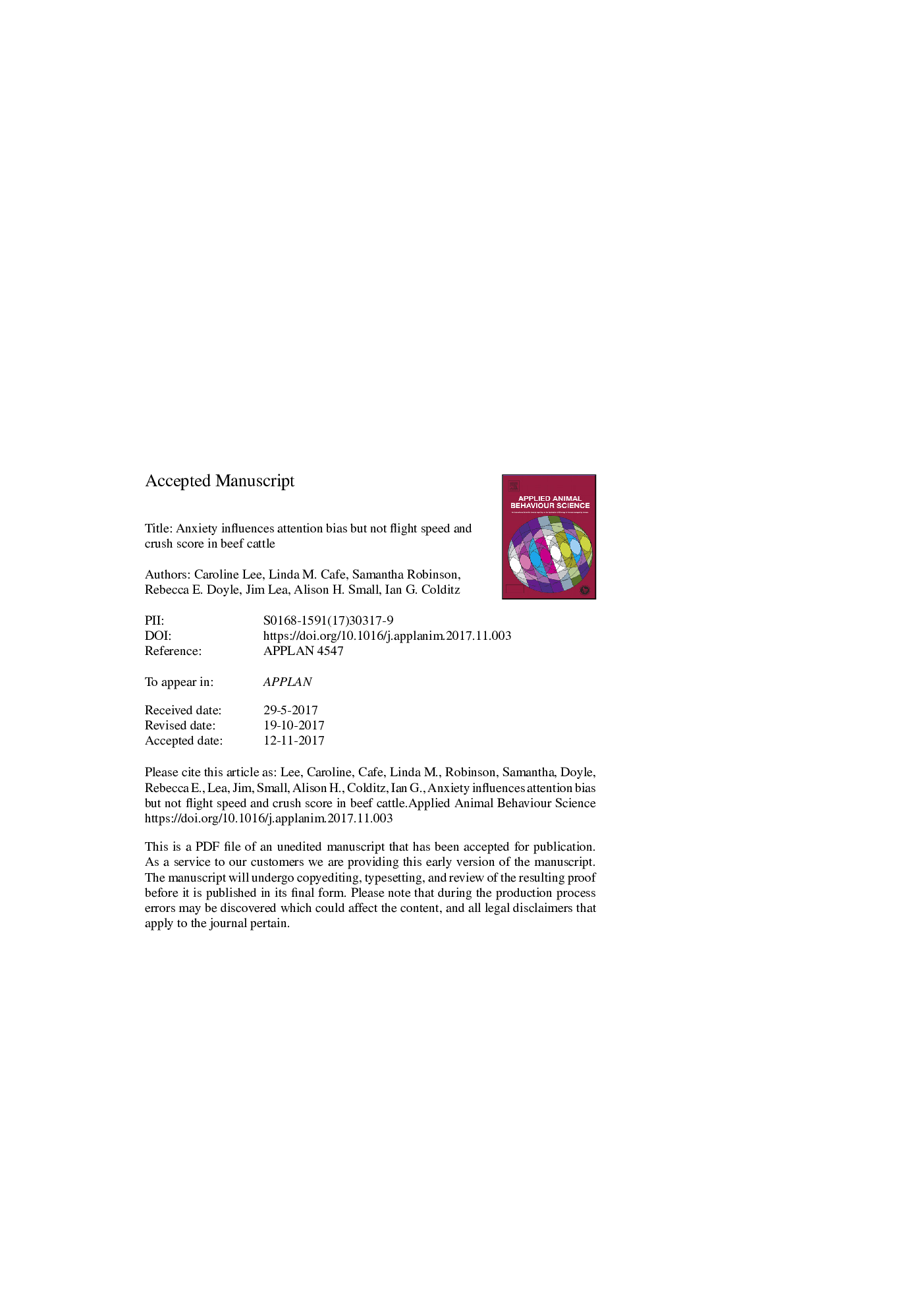| کد مقاله | کد نشریه | سال انتشار | مقاله انگلیسی | نسخه تمام متن |
|---|---|---|---|---|
| 8882740 | 1625301 | 2018 | 22 صفحه PDF | دانلود رایگان |
عنوان انگلیسی مقاله ISI
Anxiety influences attention bias but not flight speed and crush score in beef cattle
ترجمه فارسی عنوان
اضطراب بر عزت توجه، اما سرعت پرواز و نمره شکست در گاو گوشت گاو تاثیر نمی
دانلود مقاله + سفارش ترجمه
دانلود مقاله ISI انگلیسی
رایگان برای ایرانیان
کلمات کلیدی
دولت های مؤثر، موقعیت گوش هیجانی، سرعت پرواز دماسنج، درک تهدید، بی نظمی،
موضوعات مرتبط
علوم زیستی و بیوفناوری
علوم کشاورزی و بیولوژیک
علوم دامی و جانورشناسی
چکیده انگلیسی
Attentional biases towards threatening stimuli are increased when animals are in anxious states. An ability to assess negatively valanced affective states such as anxiety are important as they may be related to poor welfare. Flight speed and crush score are two well established tests of temperament in cattle, but little is known about their relationship with anxiety. This study was conducted to validate an attention bias test as a measure of anxious states in cattle and to determine whether the temperament trait(s) measured by flight speed and crush score tests were associated with anxiety. Thirty six Angus steers received one of the following pharmacological treatments: 1) anxiogenic (increase anxiety; 1-methy-chlorophenylpiperazine; m-CPP), 2) anxiolytic (decrease anxiety; diazepam) or, 3) control (saline). Thirty minutes later the steers were tested for crush score, flight speed and attention bias. The attention bias test involved measuring the response of each animal to the presence of the threat of a dog for 10Â s after which behavioural responses were recorded for 3Â min. Steers treated with m-CPP showed increased attention towards the threat (PÂ <Â 0.01), increased vigilance (PÂ <Â 0.01), spent more time with their ears backwards (PÂ =Â 0.022) and had a greater core temperature increase over the test period (PÂ =Â 0.01) compared to the control and diazepam groups. Cattle treated with m-CPP were significantly slower and less likely to eat in the attention bias test, compared to control and diazepam treated groups (PÂ =Â 0.04). The diazepam treatment did not affect any of the measures in the attention bias test (PÂ >Â 0.05). Crush score and flight speed were not affected by treatment (PÂ >Â 0.05). The results suggest that the pharmacologically induced anxiety state may not be related to these traditional tests of temperament. Increased attention towards the threat and differences in behaviours and body temperature during the attention bias test confirm that this test indicates increased anxiety in cattle. Attention bias testing provides promise as a measure of some negatively valanced affective states in cattle.
ناشر
Database: Elsevier - ScienceDirect (ساینس دایرکت)
Journal: Applied Animal Behaviour Science - Volume 205, August 2018, Pages 210-215
Journal: Applied Animal Behaviour Science - Volume 205, August 2018, Pages 210-215
نویسندگان
Caroline Lee, Linda M. Cafe, Samantha L. Robinson, Rebecca E. Doyle, Jim M. Lea, Alison H. Small, Ian G. Colditz,
